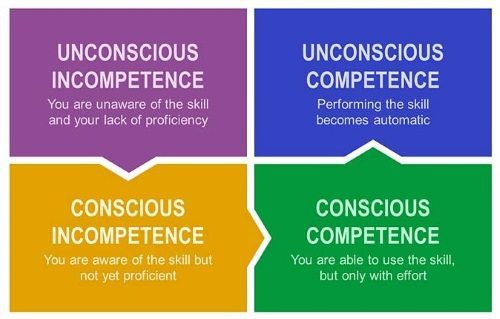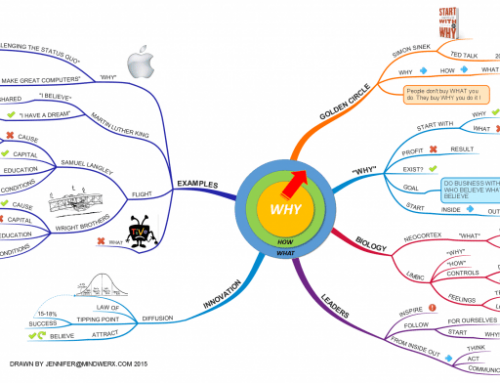In reality innovation is simple, but not easy – simple in the sense that leaders generally understand that being successful with innovation requires being opportunity seeking, encouraging creativity, a willingness to try new things, learning new skills and methods, and taking action, even risks, to create the changes needed to be innovative. But those aren’t easy to do, particularly when you’re under pressure!
That said, how do the stages of learning impact on the quest to be more innovative?
All Learning and Development specialists know, and most managers will be familiar with, the Four Stages of Learning, also referred to as the Four Stages of Competence…
- Unconscious incompetence
- Conscious incompetence
- Conscious competence
- Unconscious competence
I want to look at these in relation to making innovation happen in organisations, AND I want to suggest that a Fifth Stage of Learning is vital for success, particularly for leadership competency.
1. Unconscious incompetence
Unconscious incompetence implies we are unaware we lack the knowledge and skills needed to innovate. This may explain why many organisations, even industries, fail. They simply don’t know what’s required and can be in a state of blissful ignorance right up until they are in so much trouble they cannot recover. We see this happening all around, as large and once successful companies, entire industries, and even cities go the way of the dinosaurs.
People in such organisations likely feel surprised and hurt that the company, bosses, board, union, or government let this happen to them. And they’d probably be right. Leaders in this position desperately need to lift their game. The problem is they may not know it, so the first step is to shake things up by asking some serious questions, and start the learning process. The problem then is who is actually able to stir things up?
2. Conscious incompetence
At the conscious incompetence stage we are becoming aware of what we don’t know or can’t do. For some this is an exciting time, as they are challenged to learn more, try more, and strive to take themselves to a new level. However, this can be a time of great frustration for people who are aware they lack skills and want to do something about it, but are in an organisation that isn’t supporting them.
This frustration is more common than we might like to believe. Studies tell us that 70-90% of people in larger private and public organisations are disengaged with the purpose of the organisation. Innovation surveys tell us most people believe innovation is important to their success, but that they are not doing what is necessary to make it happen.
Staff turnover and disengagement are likely signs of this situation. People who know they don’t have what they need to be creative and innovative will rile up when constantly being told innovation is important, and everyone needs to get involved. Leaders and L&D professionals need to recognise what knowledge and skills are needed, and take action to give people the wherewithal to support the innovation effort.
And what about those people and organisations that know they don’t have the skills, and don’t care? Enough said.
3. Conscious Competence
A preferred stage to be in is Conscious Competence, as people develop knowledge, learn tools, and develop skills needed to be more creative and innovative. All sounds good, however there can be a problem. The Four Stages of Learning theory says people in this stage have the wherewithal to deliver, but need to ‘consciously’ apply new methods etc. to be effective. And that can be a challenge.
In many cases, organisations concentrate learning and development efforts on people and areas asking for it. This means skills are developed by some people and in some areas, but not in others. How often do workshop participants say they ‘love’ the new methods they’ve learnt, but no one back at work is interested, or the manager doesn’t support them.
This is a highly frustrating situation that quickly leads to disengagement. Real skills development happens back at work, after the necessary training is done, only if learners are well supported and encouraged to apply new skills.
Of course it’s usually the people and areas that DON’T ask for, or participate in, learning and development initiatives who will need them most.
And for large organisations it is seemingly impossible to get everyone skilled up in the timeframe needed to create the tipping point for change. So what is to be done?
It comes back to leaders and L&D professionals taking action. Having determined what knowledge, methods, and skills are needed, they need to find real ways these can be applied as part of any training and development efforts, ensuring they are being applied properly.
This can be done in a variety of ways. 90-Day Innovation Challenges are one way to effectively involve large groups. It starts with a clear specific focus to work on and an understanding of the current situation and desired future. Then in a 1-2-day workshop participants creatively ‘blitz’ the challenge, generating lots of ideas to meet it, and start to formulate possible solutions.
Then over the ensuing weeks they are supported and encouraged back at work to continue working in teams on these potential solutions, aiming to either implement or bring recommendations to senior leaders within the 90 days. Each Innovation Challenge is then showcased and improvements made for the next round.
The benefits of this approach are short wins on key focus areas, and the development of people skills that lead to sustainable behavioural and cultural change.
Of course events like innovation challenges alone don’t make innovation happen, but they are a good sign of an organisation’s commitment to not only giving people the knowledge and skills they want, but to actually supporting them in the workplace.
It can also be a real advantage to have internal change agents/facilitators to support staff going through short course training or working on departmental initiatives. These innovation facilitators or champions of change help participants to ‘consciously’ use their new skills – vital in this stage of learning.
4. Unconscious Competence
Unconscious competence is seen as the ultimate goal within the Four Stages of Learning. Wikipedia describes it as…
The individual has had so much practice with a skill that it has become “second nature” and can be performed easily. As a result, the skill can be performed while executing another task. The individual may be able to teach it to others, depending upon how and when it was learned. (https://en.wikipedia.org/wiki/Four_stages_of_competence)
The danger lies in the last line ‘The individual may be able to teach others…’. While it is undoubtedly true, the question is – are they able to teach others? I suggest there is a hidden problem, and that a fifth stage is needed.
I have worked with a lot of great people over the last 35 years – inspirational senior executives, highly experienced professionals, and skilled office staff, technicians, and factory workers who do an amazing job ‘almost in their sleep’. They truly fit the definition of Unconscious Competence – they are so good at what they do they don’t even have to think about it.
And that can be the problem. Sometimes we are so expert at something we forget just how hard it was to first learn it. Ever tried to teach a teenager how to drive? When a task/skillset seems ‘obvious’ and ‘simple’ we don’t understand why others struggle, why they just don’t get it. Worse still, we can get frustrated when people dither and fumble with such simple things. We may even start to consider them inadequate, and let them know it, usually unintentionally through body language and tone of voice.
Have you ever said ‘it’s easier to do it myself, than to try to show someone else’? I think most of us can relate to this.
The challenge is many unconsciously competent experts are super busy, and may not see the teaching or training of others as a priority, or one of their responsibilities. Which can again be highly frustrating for those around them, who may feel they are being abandoned or even demeaned.
So this is clearly another challenge and action for leaders and L&D professionals. Time and instruction needs to be devoted to ensure our unconsciously competent experts are given the wherewithal to teach, instruct, guide, and skill others, who will then teach others when they in turn have mastered a skill.
This is where a Fifth Stage of Learning is needed, and it might be called Conscious Coaching/Mentoring/Teaching/Leading – I like the term Conscious Cultivation.
5. Conscious Cultivation
Conscious Cultivation is where our unconsciously competent people are able to foster the development of skills and knowledge in others. The underlying concept isn’t new – it has been said that to master something, learn to teach it (effectively of course). But it is a level of learning that requires conscious effort.
Conscious Cultivation needs to become part of the innovation leader’s job, with time allocated to it. And with the skills needed for people to be more creative, more intrapreneurial, and more innovative this is vital for success. Innovation cannot be left to the ‘Innovation Department’ or ‘Innovation Lead’ because they alone don’t enable change at the frontline.
Innovation Departments can help drive strategic actions with the organisation’s senior leaders and L&D professionals, whereas a leader who is at the Conscious Cultivation stage can drive behavioural change throughout an organisation.
A Call to Action to Make Innovation Happen
So what needs to be done if you’re seeking to create an environment that supports innovation? It will be different for every organisation, but here are some basic steps to consider…
- First is to establish where you’re at in terms of the stages of learning, about innovation. Does the Board and Executive have a solid understanding of what Innovation is, and what is needed to make it happen in the context of your organisation?This could start with Board, CEO, and/or the Executive Team executive briefings, to get an idea on where they’re at in their understanding, why they believe innovation is important, and where they feel the organisation needs to be more innovative. This is about awareness building so planning can get underway. As an Innovation facilitator this is my usual first stop in an organisation.
- Once this is done the CEO and/or Executive Team member, working with the Innovation Lead, if there is one, designs a plan of attack. This may involve an Innovation Health Check and consideration of tailored facilitations with the senior group and next level of leaders, to establish an approach relevant and suitable for the organisation.
- Next will be the identification of some specific areas where the organisation needs to be more innovative – what we call Areas of Opportunity. This is done by the senior leaders, who now have a better understanding of what it takes to make innovation happen. These opportunities become the focus for the next level of learning and development. This can be done with activities such as a series of 90-Day Innovation Challenges, and/or targeted training integrated into the skills development program. Even short ‘Lunch & Learn’ presentations can do a lot to raise awareness and create action.
- The next logical step is to develop a group of Innovation Champions – experienced people who undertake intensive facilitator training to develop skills needed to support teams, using a range of Deliberate Creative Thinking tools and processes. They also act as advisers to managers seeking to develop the creativity and intrapreneurial spirit needed for innovation to happen.
So there you go, it’s just a start, but as we’ve been saying for a long time now Innovation is Simple, But Not Easy!
If you’d like to learn more about how Mindwerx helps individuals and organisation to Think, Learn, and Innovate better contact me anytime on bill@mindwerx.com or +61(0)419 645 299![]()
And all the very best with your innovation efforts – it is definitely worth doing.








Leave A Comment
You must be logged in to post a comment.